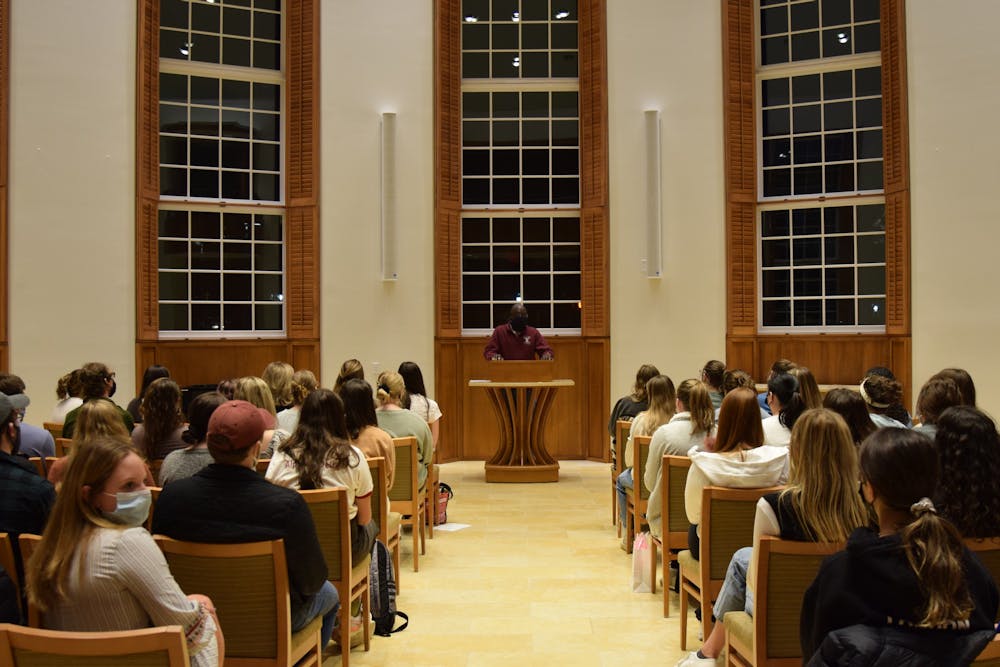Updated as of Dec. 5, 2:18 p.m. to include information from the Anatomical Gift Program about the program and memorial service.
Anatomical donors of Elon's Anatomical Gift Program, referred to as silent teachers, provide a resource for students and professors in undergraduate biology, as well as Elon’s School of Health Sciences. Through the Human Anatomy Lab, students and professors get the opportunity to learn from these anatomical donors who have dedicated their bodies to science and education, after death.
To honor the university’s silent teachers, a memorial service is held at the end of every semester in the spirit of reflecting on all that was accomplished with the help of each silent teacher. The fall 2021 memorial service was held in Numen Lumen on Thursday, Dec. 2 and was open to professors, students and family of silent teachers to attend.
Senior Alessia Mercuri, who served as foreman or planner of the service, said the term silent teacher was introduced to the students at the beginning of the fall semester as a way to further dignify those who choose to donate to the program.
“Sometimes we forget that these silent teachers are individuals,” Mercuri said. “We need to pay our respects to them.”
As an anatomist in the East Carolina School of Medicine in the ‘90s, Matthew Clark said that learning anatomy through dissecting and examining human bodies is a critical part in the education process.
Clark said that hosting memorial services for the people whose bodies were donated was very important to him. Clark now serves as the Coordinator of the Undergraduate Human Anatomy Laboratory and made sure to carry that sentiment with him when he founded the curriculum.
Since coming to work at Elon and starting the human anatomy curriculum in 1999, Clark said he made sure that the memorial services were present from the beginning and remained an important part of concluding the course.
“It's an honor — their bodies are gifts — to respect the gift that was given to you and to honor that gift that was given to you, and that's why the memorial service is so necessary,” Clark said. “You leave the service with this perspective, like wow, I just worked with someone in the human anatomy lab that actually lived in this community — that donated themselves for me to learn from them.”
As a way to make the thank you more impactful, the memorial services are entirely student run. Mercuri, who planned the event with senior student lab manager Gabrielle Clancy, was in charge of reaching out to members of the program who worked with the silent teachers to speak at the service. In addition to that, Clancy went over each anatomical donor’s cause of death, and the two held a moment of silence, as well.
Mercuri, who got involved in the fall of her sophomore year when she first took anatomy as a class, said she was very proud of the turnout this semester. While she anticipated roughly 40 people at the most, she estimates at least 60 were present — a turnout she had never seen before.
As of 2017, Elon receives their donors through the Anatomical Gift Program, which was founded and developed by director Dianne Person. The Anatomical Gift Program is the first will-bodied program in the state of North Carolina to be unaffiliated with a medical school, Person said.
To be a will-bodied program means that the individuals themselves must choose to be donated once they are no longer living. Person said that they do not accept next of kin donations, which means that the donor cannot be donated by the donor’s next of kin.
“No one can donate another person,” Person said. “We felt really strongly, morally and ethically, that the only person to make the decision to donate his or her body, is the individual themselves.”
According to Clark, before he came to Elon, there was one anatomical board in North Carolina that was responsible for providing donors to the entire state; the board also only provided these donors to medical schools. Since Elon is not a medical school, Clark said that the university had to go out of their way to receive donors from anatomical boards located in South Carolina and Virginia.
Now, through the Elon Anatomical Gift Program, residents of North Carolina can register in the program for anatomical donation. Person said that since 2017, Elon University’s Anatomical Gift Program has registered over 577 North Carolina residents who wish to bequeath themselves after death to serve as silent teachers.
As of December 2021, the undergraduate anatomy program has received a total of four for the 2021-22 school year, according to Clark. On average, he said they typically receive five donors a year from the Anatomical Gift Program.
To further remind students that their silent teachers had a life prior to serving in a teaching capacity after death, personal information about each anatomical donor is shared at the service, Person said.
Clark also said the need to acknowledge and respect the gift that a donor provides is essential, along with being able to reconnect with one’s humanity after having those lab experiences.
“You're working with human bodies, and you're working with human bodies from individuals that actually had a life — had a family,” Clark said. “I take a lot of pride in that — making sure that the students have an experience that they can reconnect with the fact that these are real individuals, and that means a lot to me.”


